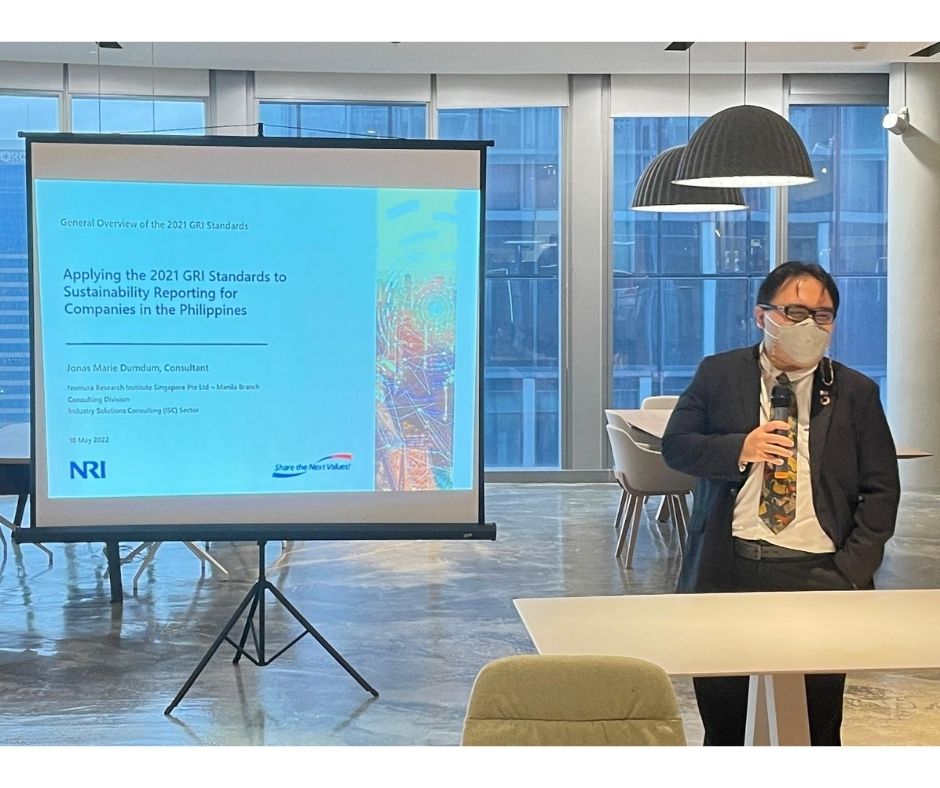”Sustainability reporting is a learning process to improve sustainability implementation”, insights from the NordCham Sustainability Committee
On May 18, the Nordic Chamber of Commerce Philippines hosted a Sustainability Committee meeting on the topic of sustainability implementation and reporting at Spaces in World Plaza, BGC.
Attendees included representatives from: Arla Foods, ASSIST, AstraZeneca, Converge ICT Solutions, Embassy of Sweden Manila, Gabriel, G.P.M. Inc., Nokia Solutions and Networks Philippines, Novo Nordisk, Oxford Business Group, Maersk Sealand and WellAtSea.
The committee meeting focused on the Global Reporting Initiative (GRI) standards as an introduction to implementing sustainability in the organization and reporting on goals. The GRI standards are a comprehensible framework for sustainability implementation and reporting, and reporting with the GRI standards can be tied to the Sustainable Development Goals. Out of the companies present, four have worked with the GRI standards, as sustainability reporting is only mandated by the SEC for publicly-listed companies.
The keynote speaker, Mr. Jonas Marie Dumdum, Consultant under the Industry Solutions Consulting (ISC) sector for Nomura Research Institute Manila Branch, has extensive experience working with publicly-listed companies in the Philippines on how to improve their sustainability journey through reporting, analysis, and strategy formation. NRI Manila is a management consulting firm that provides Philippine market and industry research, market entry strategies, human resources management, operation reform consulting, and IT solutions. At the meeting, Mr. Dumdum shared his experiences working with the GRI standards in firms, with insights on:
Sustainability reporting and reporting with the GRI standards are a tool to measure impact on stakeholders.
During sustainability reporting, companies must determine their ‘material topics’. These material topics are within economic, environmental and social. Companies must determine their individual material topics based on their industry and their values, and based on what their operations have the most impact on. Then the company must determine how to handle these topics internally with the right management.
Sustainability reporting is meant for the private sector to enable them to track and drive sustainability. And even if not mandated by law, it can still serve as a platform to start the sustainability journey.
For the company to start the sustainability journey, the company should first review their values. Then the company should find the data that is easily measurable and aligns with the chosen values, and then start to track the data.
Sustainability reporting is an ongoing cycle, which is a learning process to improve sustainability implementation. Meanwhile, sustainability reporting is also meant as a means to showcase what the company is already doing.
If the company is not mandated by the SEC to conduct sustainability reporting, but still wants to report and implement sustainability, an idea is to use the SDGs. By looking at the individual targets and indicators under the SDGs, it is possible to align the company with these. Furthermore, NEDA tracks 155 indicators, and the firm can align with these to start with.

The committee meeting also provided ample opportunity for business partners of NordCham to voice their experiences regarding reporting with the GRI and reporting as part of the implementation of sustainability in their organizations. Among the topics discussed, these were highlighted:
Sustainability reporting provides a snapshot and overview of the full business operations and the impact of operations on stakeholders.
Sustainability should be a management system and at the core of the business, rather than on the fringes. What is not sustainable is not profitable, with an example being employee satisfaction leading to better service delivery.
Sustainability reporting should not only be conducted to be compliant with the law, but has to translate into change in mindset and actionable behavior of the company.
Benchmarking with other companies in the same industry can lead to inspiration and progress.
The committee meeting is the 2nd meeting of the recently launched Sustainability Committee by NordCham. The NordCham Sustainability Committee aims for more collaboration across industries and to learn from each other and from experts. Going forward, the Sustainability Committee hosts 9 annual meetings of varying sustainability topics with resource speakers and sharing of best practices, opportunities for networking and building partnerships, as well as collaboration with government units.
The Committee is intended for business partners of NordCham, but guests are also accepted. Interested guests are welcome to contact Executive Director, Jesper Svenningsen at js@nordcham.com.ph.
NordCham Philippines looks forward to sustained collaboration and showcasing the sustainability initiatives of business partners, while contributing to positive change by forging stronger relations with the government.
